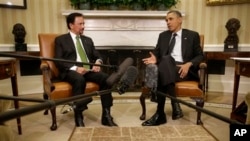WHITE HOUSE —
President Barack Obama met with the visiting Sultan of Brunei Tuesday to discuss mediation of maritime disputes between several Asian countries.
Obama praised the Sultan as “a key leader in the Southeast Asian region” and thanked him for trying to ease tensions between China and Japan and the Philippines over ownership of islands in the South China and East China Seas. China has recently increased patrols near those islands.
Obama said Asian countries involved in the maritime disputes should abide rule of law and international standards to ease tensions in the region.
“His Majesty has shown great leadership in trying to bring the countries together, to make sure that everybody is abiding by basic precepts of rule of law and international standards, so that conflicts can be resolved peacefully and effectively, and that everybody is bought in to that kind of structure," Obama said.
The U.S. Director of National Intelligence James Clapper told lawmakers Tuesday that China’s tougher attitude in the maritime disputes is partly a response to the U.S. strategic “pivot” toward the Asia-Pacific region.
Addressing a U.S. Senate committee about his annual assessment of worldwide threats, Clapper said China’s new leaders are facing internal challenges that could grow into domestic unrest, so they are likely to maintain an uncompromising stance on foreign policy.
Clapper also said new leaders in Beijing, due to take office this week, see the increased U.S. attention to the Asia-Pacific as an attempt to undermine China’s position in the region.
U.S. National Security Adviser Tom Donilon Monday denied any such intention of Washington’s policy shift.
The Asia-Pacific maritime disputes are likely to be discussed at the East Asia Summit and the U.S.-ASEAN Summit, both of which Brunei will host in October.
President Obama is expected to attend the U.S.-ASEAN gathering, which he said will deal with a wide range of issues, including trade and the world economy.
Obama pointed out that he is the ninth U.S. president to hold office during the Sultan’s 45-year reign. He also said the Sultan’s interest in aircraft makes him perhaps the only head of state to pilot his own Boeing 747 airliner to Washington.
Obama praised the Sultan as “a key leader in the Southeast Asian region” and thanked him for trying to ease tensions between China and Japan and the Philippines over ownership of islands in the South China and East China Seas. China has recently increased patrols near those islands.
Obama said Asian countries involved in the maritime disputes should abide rule of law and international standards to ease tensions in the region.
“His Majesty has shown great leadership in trying to bring the countries together, to make sure that everybody is abiding by basic precepts of rule of law and international standards, so that conflicts can be resolved peacefully and effectively, and that everybody is bought in to that kind of structure," Obama said.
The U.S. Director of National Intelligence James Clapper told lawmakers Tuesday that China’s tougher attitude in the maritime disputes is partly a response to the U.S. strategic “pivot” toward the Asia-Pacific region.
Addressing a U.S. Senate committee about his annual assessment of worldwide threats, Clapper said China’s new leaders are facing internal challenges that could grow into domestic unrest, so they are likely to maintain an uncompromising stance on foreign policy.
Clapper also said new leaders in Beijing, due to take office this week, see the increased U.S. attention to the Asia-Pacific as an attempt to undermine China’s position in the region.
U.S. National Security Adviser Tom Donilon Monday denied any such intention of Washington’s policy shift.
The Asia-Pacific maritime disputes are likely to be discussed at the East Asia Summit and the U.S.-ASEAN Summit, both of which Brunei will host in October.
President Obama is expected to attend the U.S.-ASEAN gathering, which he said will deal with a wide range of issues, including trade and the world economy.
Obama pointed out that he is the ninth U.S. president to hold office during the Sultan’s 45-year reign. He also said the Sultan’s interest in aircraft makes him perhaps the only head of state to pilot his own Boeing 747 airliner to Washington.




